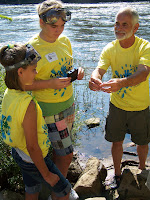
The Albany Herald
Thursday, June 4, 2008
Ethan Fowler
4-H'ers learn value of water ALBANY - Dougherty County 4-H member Keana Jones' thorough answer impressed Department of Natural Resources' Adam Kaeser.
Kaeser asked the assembled students at his presentation titled "Fish Ecology of the Flint River" what three things do fish need to survive in the river.
Jones responded: "Water, food and shelter."Jones and about 50 other 4-H members from Dougherty, Mitchell, Worth, Thomas, Baker and Decatur counties participated in the 4-H20 Camp at the Flint RiverQuarium Wednesday. The three-day camp concludes today in Dothan, Ala.
The camp covers everything about water, from conservation, the water cycle, careers involving water resources and the biology of watersheds. 4-H members, who range in age from 9-18, paid $25 to participate in the event.
This was the first year Southwest Georgia 4-H clubs came together for the camp. Mitchell County 4-H did the camp by itself last year.
Dougherty County Extension Agent Rad Yager is hoping that every Southwest Georgia county participates in the camp next year.
"Typically a (three-day) program like this costs $60 per child, but we're only charging $25 and a grant is supplementing the rest through Mr. (Charles) Stripling," said Melissa Martin, education manager at the RiverQuarium. "We're paying for lunch all three days, T-shirts and little mementos. I think it's kind of neat the kids took three days out of their summer to come to this camp and (I'm) really appreciative of the counties' 4-H leaders for providing transportation."
Georgia Youth Science and Technology Centers' Steve Rainey presented a program titled "Water Detectives." The 4-H members went down to the Flint River and sampled the water, as well as handled a crawfish that Rainey caught in a ditch to use as an example.
He said crawfish were the "mice of the river because everybody eats them."
"I've learned how the crawfish lives, how it grows back its body parts and how to sample the river's water," Worth County student member Mary Beth Amrowski said. "I appreciate that the adults come out and take time to tell us about the river.
"Eight-year Thomas County 4-H Program Assistant Amanda Carter participated in 4-H as child for four years."I hope that the kids learn about the importance of water quality and how important it is in our everyday lives," Carter said. "(4-H) is a learn by doing organization. Both of my kids are involved in 4-H and they enjoy every minute of it, whether it's shooting sports, public speaking contests, community service opportunities and 4-H camps."



